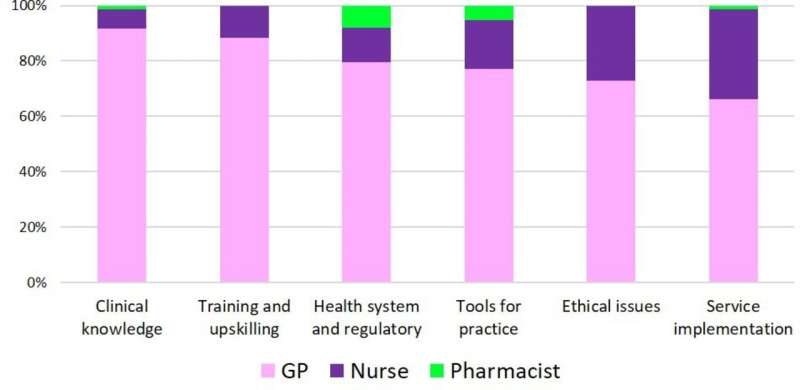This article has been reviewed according to Science X's editorial process and policies. Editors have highlighted the following attributes while ensuring the content's credibility:
fact-checked
trusted source
proofread
Supporting primary care clinicians to deliver early medical abortion, long-acting reversible contraception

The impetus for additional support and training for clinicians wanting to deliver important sexual and reproductive services has received a boost with the release of Monash University-led research.
Published in BMJ—Sexual and Reproductive Health, the AusCAPPS study found that GPs, nurses and pharmacists seek peer support and online resources to deliver long-acting reversible contraception (LARC) and early medical abortion (EMA) in Australian primary care.
Experienced and emerging providers of LARC and EMA sought support regarding clinical issues online from AusCAPPS, which is the Australian Contraception and Abortion Primary Care Practitioner Support Network, an evidence-based virtual community of practice launched by the SPHERE Center of Research Excellence in July 2021.
This research confirmed the importance of the network.
"Uptake of LARC is lower in Australia (11%) compared with other high-income countries (>30%). Additionally, with only about 11% of GPs providing EMA, women's access to these services are greatly dependent on where they live," explained first author GP and SPHERE Center of Excellence research fellow, Dr. Sonia Srinivasan.
"Our study found that primary care clinicians are looking for practical and professional support to provide LARC and EMA. GPs want to boost their clinical knowledge with input from peers and experts, nurses are looking for ways to overcome the challenges faced delivering these services in clinical practice and pharmacists seek clarity around the regulations that guide the dispensing of drugs."
The paper explained that barriers to primary care provision of LARC and EMA include a lack of provider education and training opportunities, inadequate support and stigma. LARC and EMA services are concentrated in metropolitan areas, and high out-of-pocket costs create additional barriers for young, rural and remote Australian women in particular.
The AusCAPPS Network, which has more than 2,600 members (60% are GPs, 14% nurses, and 22% pharmacists), is used extensively by participants and welcomes new members.
The study, which surveyed 2021–2023 AusCAPPS members, found that health professional peer support, point-of-care patient guides and educational webinars and podcasts were crucial online tools that supported GPs, nurses and pharmacists to deliver local LARC and EMA services.
"In order to increase women's access to these essential reproductive health services, we need more GPs, nurses and pharmacists involved in the provision of LARC and EMA," Dr. Srinivasan said. "Our research demonstrates what GPs, nurses and pharmacists actually need in practice to support this objective."
This research builds on a range of research and initiatives by SPHERE and AusCAPPS to grow the capacity of primary care to deliver Early Medical Abortion and Long Acting Reversible Contraception, including in rural and remote communities.
More information: Sonia Srinivasan et al, What do Australian primary care clinicians need to provide long-acting reversible contraception and early medical abortion? A content analysis of a virtual community of practice, BMJ Sexual & Reproductive Health (2024). DOI: 10.1136/bmjsrh-2024-202330


















